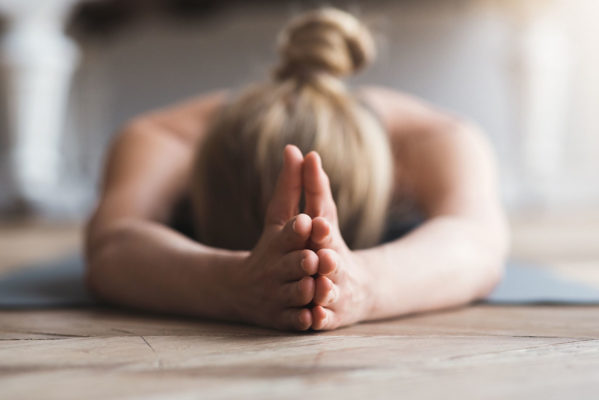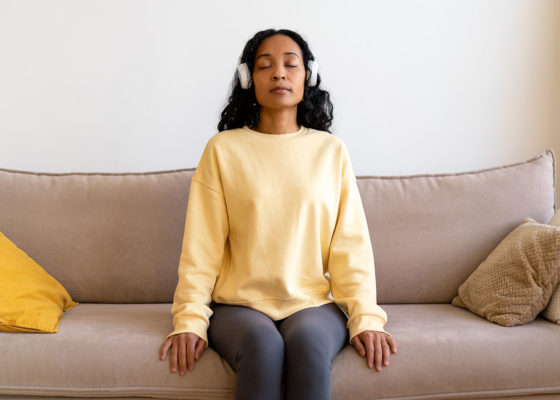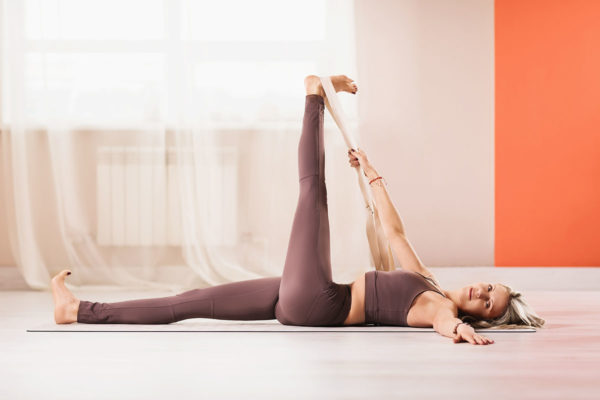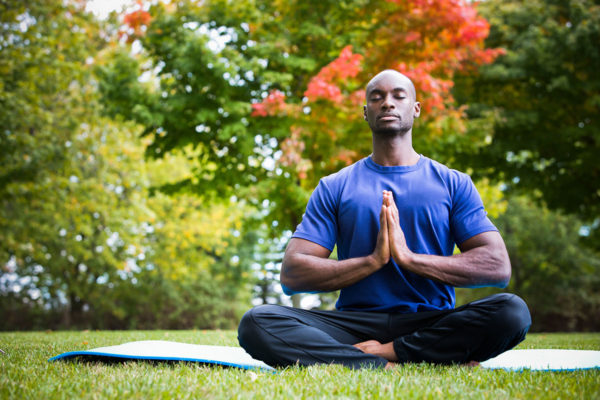If you’re new to yoga and meditation, it can be overwhelming to know where to start, which is why we’re going to start with specific tips to help with daily life struggles.
In this article, we’ll provide tips for practicing meditation with yoga, as well as different meditations and yoga poses you can do to improve your sleep, focus, and anxiety.
Tips for Meditation with Yoga

Find a Quiet Space
To meditate with yoga, it’s important to find a quiet and comfortable space where you can practice without distractions. This could be a spare room in your home, a quiet corner of your garden, or even a studio or gym. It’s important to have a space that is calming and peaceful, so you can fully focus on your practice.
Use Props and Cushions
Props can be helpful when practicing yoga and meditation. A yoga mat can provide cushioning for your joints and make it more comfortable to hold poses. Blocks and straps can also be useful for modifying poses and providing support.
When meditating, you may find it helpful to use a cushion or pillow to sit on to make it more comfortable.
Set An Intention
Before beginning your practice, take a moment to set an intention. This could be anything from focusing on your breath to improving your mental clarity or reducing stress. Setting an intention can help you stay focused and present during your practice.
Breathe Deeply
Breathing is a key component of both yoga and meditation. When practicing yoga, it’s important to focus on your breath and move with intention. During meditation, deep breathing can help you relax and calm your mind. Take slow, deep breaths in through your nose and out through your nose, focusing on the sensation of the breath in your body.
Be patient
Yoga and meditation are practices that require patience and persistence. It’s important to remember that progress takes time and that each practice will be different. Don’t get discouraged if you don’t see immediate results – the benefits of yoga and meditation come with regular practice.
How to Meditate with Yoga

Meditation can be incorporated into your yoga practice in several ways. Here are three ways to meditate with yoga:
Yoga Nidra
Yoga Nidra is a type of guided meditation that is often practiced at the end of a yoga class. It involves lying down in a comfortable position and following the instructor’s voice as they guide you through a series of visualizations and relaxation techniques. Yoga Nidra can be a great way to reduce stress and improve sleep.
Mindful Movement
Mindful movement is a type of yoga practice that involves moving slowly and intentionally while focusing on your breath. This can help you become more present and aware of your body and mind. You can practice mindful movement by focusing on your breath as you move through a series of poses, such as Sun Salutations.
Pranayama
Pranayama is a type of yogic breathing technique that can be used to calm the mind and reduce anxiety. To practice Pranayama, sit in a comfortable position and inhale deeply through your nose for a count of four. Hold your breath for a count of four, then exhale slowly through your mouth for a count of eight. Repeat this cycle several times, focusing on the sensation of the breath in your body.
Meditations for Sleep, Focus, and Anxiety
Meditation for Sleep
If you have trouble sleeping, meditation can be a helpful tool
to improve the quality of your sleep. To practice meditation for sleep, find a quiet and comfortable place to sit or lie down. Close your eyes and focus on your breath, taking slow, deep breaths in and out. Visualize a peaceful and relaxing environment, such as a beach or forest, and allow your mind to let go of any worries or stressors. You can also use guided meditations or white noise to help you drift off to sleep.
Meditation for Focus
Meditation can also help improve your focus and concentration. To practice meditation for focus, find a quiet place where you won’t be interrupted. Sit in a comfortable position and close your eyes. Focus your attention on your breath, counting each inhale and exhale. When your mind wanders, gently bring your focus back to your breath. You can also try visualization techniques, such as imagining a bright light or a peaceful scene, to help improve your focus.
Meditation for Anxiety
Meditation can be an effective tool for managing anxiety and reducing stress. To practice meditation for anxiety, find a quiet and comfortable space to sit or lie down. Take a few slow, deep breaths in and out, relaxing the body with every exhale. For a few moments, observe the incoming and outgoing breath. If thoughts or sensations arise, let them be, gently bringing your attention back to the breath. Let go and relax.
Yoga Poses to Relax Your Mind

Yoga poses can help release tension and reduce anxiety. Try these poses to help calm your mind and body:
- Child’s Pose
- Cat-Cow Stretch
- Forward Fold
- Legs Up the Wall Pose
- Corpse Pose
Yoga for Sleep
Certain yoga poses can also help promote relaxation and improve the quality of your sleep. Try these poses before bedtime to help you unwind and prepare for sleep:
- Supported Bridge Pose
- Reclining Bound Angle Pose
- Seated Forward Fold
- Supine Spinal Twist
- Savasana
Morning Meditation Ideas to Keep You Focused
Starting your day with meditation can help improve your mental clarity and set a positive tone for the day. Here are some morning meditation ideas to try:
- Wake up a few minutes earlier than usual to meditate before starting your day.
- Practice a short meditation in bed before getting up.
- Combine yoga and meditation by practicing Sun Salutations with a focus on your breath.
- Use a guided meditation app or video to help you focus and stay on track.
- Practice gratitude meditation by focusing on the things you are grateful for in your life.
How to Use Yoga and Meditation Together

Yoga and meditation are powerful tools for improving your physical and mental health. Whether you’re looking to improve your sleep, reduce anxiety, or improve your focus, there are many practices you can incorporate into your daily routine.
Remember to be patient and persistent, and don’t get discouraged if you don’t see immediate results. The benefits of yoga and meditation come with regular practice and a commitment to your health and wellbeing.

